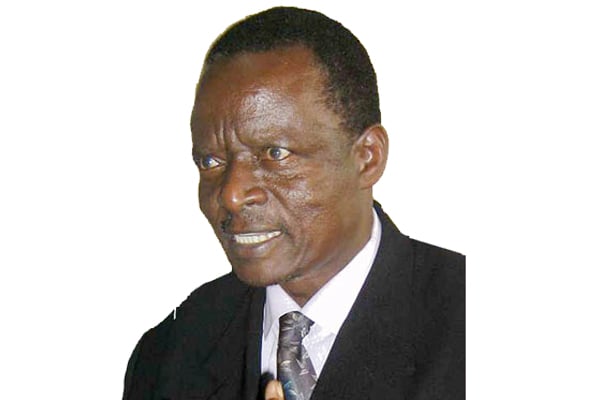Prime
Rattle of Musevenism and militarism: Another response to Dr Kabumba

Author: Moses Khisa. PHOTO/FILE
What you need to know:
- ...we also face deep social tensions, mounting land conflicts, and material hopelessness with a population that has surged tremendously.
Last week, I sketched a rough draft against Dr Busingye Kabumba’s argument for an ethnic-based federal system in Uganda, advanced in the pages of The Observer, a paper celebrating 20 years this week. In a tumultuous media environment, especially under a decidedly authoritarian political setting, The Observer has stood tall and firm, making invaluable contributions to our civic square.
I owe a personal debt of gratitude having written for the paper a good five years. Its editors, particularly the effable Richard M Kavuma, took a gamble on me back then as a young graduate student without any credentials. I still have no credentials to write about, to be sure, but my Saturday Monitor editors too have stuck to the gamble! I’m grateful.
Needless to say, Dr Kabumba, director of the Human Rights and Peace Centre at Makerere University’s School of Law, is a vastly intellectually gifted scholar, a patriot and true public intellectual. His ideas and arguments are very much worth engaging. Unsurprisingly, at any rate, for Dr Kabumba is an intellectual child of some of our finest public-spirited minds: Professors Joe Oloka-Onyango, Fred JJuuko, Sylvia Tamale, and John-Jean Barya, among others. Given the fraught nature of ethnic identity and the shaky sands of our social fabric, a federal system built on Uganda’s ethnic groups, however defined, is at best a poisoned chalice.
As I argued last week, we see an iteration of this on full display in the decentralised-governmental sphere, characterised by inexorable and endless drip-drip demands for narrowly defined ethnic-based local government enclaves. The sole purpose of the demands is to curve out space for local elite power brokers and hangers-on angling for political offices and bureaucratic positions.
The crux of the problem Dr Kabumba is deeply concerned with, indeed one that must exercise the minds of all forward-thinking Ugandans keen about the fate of our shared future, is the national question – project Uganda. I have taken a stab at this issue multiple times here, thus no need to rehash matters, but it is worth reiterating that the biggest indictment against our 1986 rulers is the spectacular failure to engineer a viable political community of shared comradeship and horizontal solidarity.
The rulers cheaply preach patriotism but practice nepotism, are big on the rhetoric of pan-Africanism and nationalism but ‘tribal’ in their policies and political actions. Today, Uganda is a highly fragile society with runaway socio-political fragmentation and deep-seated but suppressed sectarian sentiments that may explode anytime with tragic outcomes. It is arguable that ethnic federalism would likely exacerbate rather than mitigate current social fissures and fragilities in Uganda’s body-politic.
Perhaps, facetiously speaking, Uganda needs to implode so something more viable can emerge! There’s a nascent ‘abolish Uganda’ movement. In their pursuit of power in perpetuity, our rulers have deepened a system of militarism and the ethos of the gun, inherited from previous rulerships and with a colonial provenance, a subject Dr Kabumba has ably written on and on which I have had long-standing scholarly interest and, indeed, preoccupation. The popular hopes and aspirations of a truly democratically governed polity, as promised at the outset in 1986, have been subordinated to a project of life-presidency laced with blatant nepotism.
The power of the gun, the bullet not ballot, coercion not persuasion, which sustains a one-man imperial presidency, now supposedly with a ‘standby generator’ in a likely father-to-son change of guards scenario, necessarily erodes state institutions and corrodes civil society.
The state is impoverished while society is pulverised, the hallmark of Pax-Musevenica, or emirembe gya Museveni, as thoughtfully captured in an important book by Prof Joshua Rubongoya of Roanoke College, USA.
Today, Uganda is not only acutely afflicted by a decayed and dysfunctional political system with vulgar patronage on full display, state inefficiency so staggering and blatant disregard of the public interest and good; we also face deep social tensions, mounting land conflicts, and material hopelessness with a population that has surged tremendously.
A great cause of our current predicament can be located in the ethnicisation of public authority and the politicisation of ethnic identity, made worse by shameless nepotism and disregard of merit, probity, and competence in running a sound state system that would underwrite the national project.
In reimagining a viable Uganda, it is improbable that recourse to ethnic political organising, something we have done since colonial times, at any rate, or the resort to nativist social structures can be the ultimate remedy. Here, I most fundamentally depart from Dr Kabumba’s prescriptions.
The historical and comparative contours of this debate, with lessons from other countries, are worth a systematic and concerted intellectual discourse that hopefully other Ugandans can take up. In this column, I shall for sure return to them.




